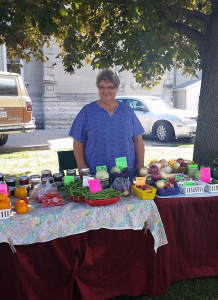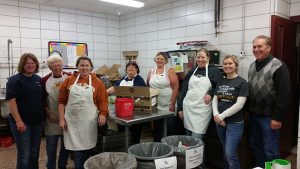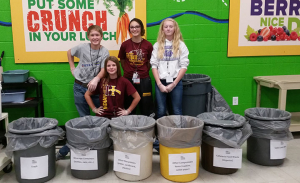Bloomfield, Iowa was selected as one of four communities in Iowa to participate in the Food Waste Reduction Assistance Project for Iowa Rural Communities. As part of the project, both residents and businesses within Bloomfield have access to many free services and supplies that will help prevent and reduce food waste through a Rural Development grant from the United States Department of Agriculture.
The City of Bloomfield, located in Southeastern Iowa, is the county seat of Davis County. With a population of 2,643 in 2016 (United States Census Bureau), this rural community boasts a beautiful town square where the historic Davis County Courthouse has resided since 1879 and is still complete with the original clock and tower. The grassy lawns surrounding the court house are where many residents and farmers meet to buy and sell locally grown food at the Bloomfield Farmers Market. The citizens of Bloomfield were both receptive and enthusiastic about participating in the Food Waste Reduction Assistance Project for Iowa Rural Communities and took advantage of services offered through the Rural Development, United States Department of Agriculture grant-funded project.
Helping Residents Reduce Food waste at Home
 The Iowa Waste Reduction Center contacted Patsy Boas, local resident and manager of the Bloomfield Farmers Market, about setting up a table to assist residents in preventing and reducing food waste in the home. Boas approved the request and the IWRC attended the Bloomfield Farmers Market in August 2017. At the IWRC table, residents were able to talk with Jenny Trent, project coordinator from the IWRC, about food waste in their own kitchens and pick up a free toolkit.
The Iowa Waste Reduction Center contacted Patsy Boas, local resident and manager of the Bloomfield Farmers Market, about setting up a table to assist residents in preventing and reducing food waste in the home. Boas approved the request and the IWRC attended the Bloomfield Farmers Market in August 2017. At the IWRC table, residents were able to talk with Jenny Trent, project coordinator from the IWRC, about food waste in their own kitchens and pick up a free toolkit.
The toolkits were designed specifically help prevent and reduce food waste within the home. Each toolkit contained a digital kitchen scale to measure food waste, a re-usable lidded soup mug to weigh food waste in, and information about tracking food waste at home and strategies that work to prevent and reduce food waste.
Trent talked with more than 20 residents in the community and explained the issues associated with food waste and easy ways in which food waste can be reduced and prevented at home. Strategies such as eating older foods first, proper food storage to extend shelf life, smart shopping, and smart preparation of foods to prevent and reduce food waste were shared with all residents that stopped by the IWRC's table at the farmers market. Residents also learned about donating food to help ease hunger in the community and composting food waste at home. The whole gamut of strategies was discussed and shared to help manage food waste in a more sustainable manner. And residents that received a toolkit were provided with both the supplies and information to begin tracking and reducing food waste and ultimately the costs associated with throwing food away.
Davis County Community School District
Residents of Bloomfield weren't the only ones who received assistance when it came to fighting food waste. The Davis County Community School District (CSD) also participated in the project. The Iowa Waste Reduction Center was welcomed into the local K-12 schools to conduct waste audits in collaboration with the Iowa Waste Exchange (a program through the Iowa Department of Natural Resources that matches wastes and by-products that would normally end up in the landfill with people/entities interested in using the materials).
 The district has three schools; an elementary, middle, and high school. Both the elementary and middle schools share one kitchen but have two separate cafeterias while the high school is situated close by and has a separate kitchen and cafeteria. Waste sorts were conducted at all three cafeterias and included kitchen waste from both kitchens.
The district has three schools; an elementary, middle, and high school. Both the elementary and middle schools share one kitchen but have two separate cafeterias while the high school is situated close by and has a separate kitchen and cafeteria. Waste sorts were conducted at all three cafeterias and included kitchen waste from both kitchens.
Dan Roberts, Director of Support Services within the school district, provided assistance during the waste sorts. "Davis County Community School District knocked it out of the ballpark," commented Trent. "Dan got quite a few student volunteers to help their peers sort the waste left on their trays after eating lunch."
 Both kitchen waste and post-consumer food waste was measured. Kitchen waste included fruit and vegetable peelings and trimmings as well as leftover foods that had expired or met the one-time reheat policy. Post-consumer waste consisted of items left on students' trays after they had eaten. The IWRC calculated that Davis County CSD generates a daily average of 239 pounds of food waste from 846 students during lunch while the kitchens throw away a daily average of 30 pounds. Combined, that average jumps to 48,420 pounds (24 tons) of food waste each year that is sent to the landfill.
Both kitchen waste and post-consumer food waste was measured. Kitchen waste included fruit and vegetable peelings and trimmings as well as leftover foods that had expired or met the one-time reheat policy. Post-consumer waste consisted of items left on students' trays after they had eaten. The IWRC calculated that Davis County CSD generates a daily average of 239 pounds of food waste from 846 students during lunch while the kitchens throw away a daily average of 30 pounds. Combined, that average jumps to 48,420 pounds (24 tons) of food waste each year that is sent to the landfill.
Compost Collaboration between the Schools and the City
One of the most exciting outcomes of the project is that Davis County CSD has formulated a plan to divert most of the district's food waste from the landfill by implementing a composting project. In a meeting with Bloomfield's Interim Director of Public Works, Chris Ball, Sustainable Schools Representative, Paul Fleetwood, and Dan Roberts, the IWRC offered guidance on following Iowa's organics composting regulations as well as techniques for maintaining an active compost pile. The school district is planning on hauling the school's food waste a short distance to the city's yard waste composting site which already has a reliable source of carbon to mix with the food waste. This partnership between the City of Bloomfield and Davis County CSD promulgates a successful situation where food waste is diverted and residents of the community are provided with free compost.
While the IWRC will continue to assist both the City of Bloomfield and Davis County CSD to prevent and reduce food waste, working with Bloomfield citizens has been extremely rewarding. "You know you're reaching citizens when they actively seek you out to help solve issues associated with food waste," commented project coordinator, Jenny Trent. "It's communities like Bloomfield that are working together to solve important issues like food waste!"
This project began October 1, 2016 and continued to September 30, 2017.
This material is based upon work supported under a grant by the Rural Utilities Service United States Department of Agriculture. Any opinions, findings, and conclusions or recommendations expressed in the material are solely the responsibility of the authors and do not necessarily represent the official views of the Rural Utilities Service.
The Iowa Waste Reduction Center and the University of Northern Iowa are equal opportunity providers and employers.

